
CHASING THE INDRI
Journey To Beauty & Chaos In Paradise
Islands
Mauritius
II: Globalization, Life And Death In Land Of The Dodo
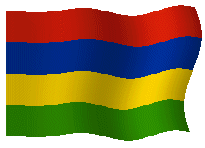
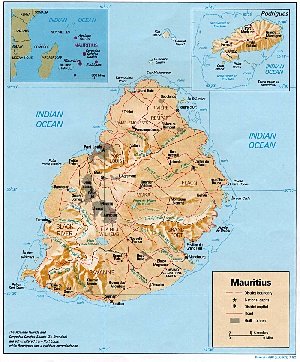
July 2003
Tan Wee Cheng, Singapore
Mauritius
II: Globalization, Life And Death In Land
Of The Dodo
As
dead as a dodo. This is a bird that
once lived in
Mauritius
– a fat, clumsy giant cousin of modern-day pigeon has a strange
awkward-shaped beak and could not fly. It
once thrived on this island that forms the remains of an extinct volcano at the
lower end of the
Indian Ocean
, where pure precinct isolation protected the flightless bird from the ravages
of larger predators. However, after
the arrival of man in the 17th century, the bird was hunted to
extinction, and its eggs devoured by dogs, cats and pigs brought here by their
human masters. One might be tempted
to blame the Dutch sailors, though contemporary accounts said that the dodo
tasted disgusting, but who could blame these sailors who had spent half a year
on the sea from Europe and would have tasted nothing but half decomposed turtle
and sick chickens? Whatever it is,
today, the dodo, or rather, skeletal remains of this once magnificently ugly
bird, is only found in museums. In
Mauritius
, the dodo has become a national symbol. Around
the world, it has become the byword for extinction, or dead, dead silence.
Port Louis
, capital of
Mauritius
, on a Sunday, is quiet, not quite as dead as a dodo but not significantly more.
Hardly any soul in sight. A
watchman sweeping the entrance to the ornate mosque, its inner compound with a
lotus pool; an elderly Chinese hawker selling yong tau fu, a whole category of
dumplings the Hakka people of southern China are famous for; vendors arriving,
setting-up stalls in the nearby market. This
is a small city at the head of a sheltered bay, hammered in by the mountains.
----
Mauritius
– named after Maurice, Prince of Orange, leader of the United Dutch
Provinces. At 1865 sq km, this is
an island three times the size of
Singapore
but will only 1.2 million people. The
friendly Mauritians tend to complain about how crowded their island is, but I
can only wish
Singapore
is larger, and equally endowed with a few wild green mountains, some mysterious
unfathomable forests, ocean-beating cliffs, fine sandy beaches and pretty
tropical coral atolls. Maybe I am
asking too much, for
Mauritius
has become the by-word for paradise.
This
is land of the sugar cane – 80% of all cultivated land is covered by sugar
cane plantations and 25% of all export earnings is derived from sugar.
As one drives across the island, the roads pass through endless horizon
of sugar cane, singing Bihari peasants and an occasional Creole mansion. It was
the Dutch who first introduced the crop to this island and within no time the
sugar cane has covered the entire island. The
French intensified the cultivation of sugar cane and the local French
aristocracy grew enormously wealthy from it.
They built palatial mansions in their enormous estates across the island,
and held grand parties and festivities. When
the British Navy came during the Napoleonic War, these “Grand Blanc” (or
“Great Whites”) surrendered quickly to the British on the condition that
they were allowed to run the economy and practice their religion and customs in
the same way as before.
The
sugar barons, as this wealthy class is known, continue to control the Mauritian
economy today. The Franco-Mauritian
community comprises of about 1% of the population but most of the wealth.
51 of the top 100 chief executives in
Mauritius
are Franco-Mauritians, and five of their top families control 18 of the top 50
companies in the country. This is a
country with a GDP per capita of US$3800 and most of the wealth highly
concentrated within this very small group of people.
In 1968, just before independence, riots broke out between Creoles and
Muslims. "Government announced
that only 4 died but we all knew more than 100, courtesy of BBC," said a
senior Franco-Mauritian banker. "And
most of my relatives departed emigrated to
France
,
South Africa
,
Australia
." The
rest stayed on and the old lifestyle continued.
The rules of the game since then is, the Indian-Mauritians will run the
government and civil service while the Franco-Mauritians keep the economy and
their wealth. As for the Creoles,
well, well, well.
----
This
is a fertile land midway between the tropics and temperate. Thus it
can grow many types of fruits - both tropical and temperate ones, including
strawberries, papayas, bananas, melons and pineapples. However, they don't
seem very tasty or large. Perhaps this is the case of a Jack of all trades
and master in none. What this island grows well is sugar cane.
Unfortunately, they don't drink sugar cane juice, which Southeast Asians love.
Here, they export everything.
----
I
stayed at Labourdonnais Waterfront, the top business hotel in
Port Louis
. The Waterfront area is the most
modern and chic area in the capital. The
rest of the capital is fairly dilapidated apart from the glass
tower-headquarters of a few local banks and financial institutions.
Mauritius
aspires to be the regional financial centre of the
Indian Ocean
rim, but post-Apartheid
South Africa
is the real powerhouse of
Africa
. Who needs to do banking in
Mauritius
?
Small
nations like
Mauritius
and
Singapore
provide refuge for capital when larger neighbours are less advanced, or in
political trouble, but when order is restored, the money runs away if there is
no special reason to remain. We all have to find our niche and survive.
Both
Mauritius
and
Singapore
face the same challenges.
Mauritius
tells the world that it is part of
Africa
and
Africa
’s bridge to the world, but the reality is somewhat different.
“We
don’t really know
Africa
well. We went in and are cheated
by the Mozambiqueans, Malagasy and so on. We
don’t do business the same way they do. But
if we don’t move in, where do we go from here, from this side of the
Indian Ocean
?” said another senior banker.
I
am reminded of
Singapore
’s own experience in dealing with
China
,
Vietnam
, and the rest of
Asia
. We are Asians and we aren’t.
We thought we know the region well, but we have a lot to learn, and we
are paying a very high school fees to learn from our mistakes.
Transparency
International rates
Mauritius
as one of the least corrupt country in
Africa
, after
Botswana
and
Seychelles
. However, this is nothing is
celebrate about, for African standards of public and corporate governance are
hardly impressive by world standards. Everyone
here knows the intertwining strings of influence and money in this country, and
how the tiny elite and politicians pat each other’s back.
----
Mauritius
is a member of the
Commonwealth of Nations
(i.e., an organization of former British colonies who have decided to meet
together for the poorer countries to beg for some cash from the richer ones, and
for the Brits to re-live the long-past glories of the Empire in a painless
manner) and so I thought they might be very English.
In fact, I was surprised to find how French this island is.
The locals speak Creole at home and French at work.
English, however, is the language of public signboards and documentation.
The premier local business periodical, Business Magazine, has an English
title and French contents. There
are a few French language papers but only a weekly in English, called News on
Sunday. News on Sunday, which has
screaming tabloid-like headlines on Beckham and the latest Miss South Africa, is
on sale on Friday and usually sold out by Saturday.
People
here – the well-to-do ones, that is, still send their children to
France
for studies, though there is an increasing trend for people to go to
Australia
.
There
is French cable TV soft porn on Fridays and Saturdays.
Once I stumbled onto a bizarre Chinese porno dubbed in French, and
it contained people wearing costumes of different historical periods.
Of course, costume authenticity is not critical in such movies.
----
Port Louis
has a
Chinatown
. Here it is quiet, dilapidated and
dirty. Like
Chinatowns
elsewhere, it has traditional Chinese gateways.
A few street hawkers and rugged stray dogs greet the visitor.
A few Chinese restaurants, but again, the best Chinese restaurants have
moved away to the suburbs.
Mauritius
has over 30,000 Chinese, descendants of Hakka traders. Today, they are
scattered throughout the island but still many have remained in
Port Louis
and surrounding areas. Isolated
from the mainstream Chinese-speaking world, the Sino-Mauritians are relatively
integrated. They are more
comfortable speaking Creole and French, than Mandarin and Hakka.
As a
Chinese street
hawker told me, “we have lost our roots.”
All
humans are prisoners of history. Sino-Mauritians have names in
formats which are unfamiliar to most ethnic Chinese worldwide.
The full name of the first generation Sino-Mauritians often become the
surname of his descendants. For
example, say somebody called Jean-Claude Yong Shing Fook.
Note the French first name, Jean-Claude: this is a guy – Jean is a
masculine name in French. His
surname is Yong Shing Fook, for that is the full name of his great grandpa who
emigrated from
Guangdong Province
,
China
, in the 1920’s. Yong was
obviously the surname of his great grandpa and Shing Fook the “first name”.
However, colonial bureaucrats those days in
Mauritius
had decided that this is their preferred format for names.
And so all of Monsieur Yong’s descendants would have to be known not as
Monsieur Yong but Monsieur Yong Shing Fook.
In
any case, some supposedly Chinese traits have remained.
I
have met a number of well-educated local Sino-Mauritians, many of them hold
important positions in the financial sector.
Chinese, as usual, are good at numbers and technical things and hence
they basically run the finance and accounting departments of a large local bank,
as well as anything that requires familiarity with numbers.
The Franco-Mauritians and Indians tend to score better in
marketing and group leadership, and so run a lot of major operations – in fact
they hold the most important positions in the banks. (Of course, it is the
Franco-Mauritians who actually own everything!)
The Creoles (descendants of African slaves) generally do less well in
schools, and many do manual work.
----
There
is no Harry Potter fever in
Mauritius
. You can walk in and buy the book
off the shelf. I'm not totally sure
if Mauritians read a lot –
Mauritius
rank 67th in the Human Development Index and 2nd in
Africa
. The local bookshops are few and
small. I don’t know what they do
after dark. Everything closes down
at
5pm
– including restaurants and bars (apart from those in hotels and on the
Waterfront). Perhaps they all go
home and watch TV or make babies.
----
Manufacturing
is the second pillar of the Mauritian economy (followed by tourism and finance).
The heart of Mauritian industry is the Export Processing Zone (EPZ).
Since the 1980’s,
Mauritius
has provided incentives for foreign manufacturers to produce here.
This has led to massive investment by
Hong Kong
textile manufacturers seeking to take advantage of unutilized textile quotas
Mauritius
has with major Western economies. HK
investment in EPZ has increased employment significantly in
Mauritius
and created a second pillar to the previously largely agricultural nature of
the local economy.
16%
of the nation’s workforce work for the EPZ, 80% of which are in the textile
industry, which contributes to 20% of the Mauritian GDP.
Mauritius
, a warm subtropical island, has suddenly become
the largest exporter of woolen knitters in the world.
However, these investors soon realized that Mauritians were somewhat less
productive than workers in
China
, and this led to a bizarre development – Mainland Chinese workers were flown
into
Mauritius
to work in these HK-owned factories which have already used up both HK and
China
’s textile quotas with EU and
USA
, to supplement the less productive local workforce.
The
EPZ, however, is now in deep crisis.
China
is now in the World Trade Organization and much of the previous textile quotas
lifted. With
China
’s enormous industry capacity and cheap but highly skilled and productive
workforce, there is no more reason for
Hong Kong
manufacturers to fly Mainland Chinese workers to far-flung factories in
Mauritius
,
Guatemala
and
Honduras
. As Mauritian subcontractors have
not upgraded their skills and equipment during the good old days, they find
their cost high and sales revenue dropping.
One by one, the foreign investors leave, and factories close.
The
process is continuing. The story is
not new.
Mauritius
has to find its niches fast, just as
Singapore
faces the same challenge.
Yet another anecdote in our increasingly globalised world.
----
Last
week, CNN had a report about the plight of Diego Garcia, the largest island
atoll in the world, right at the heart of the
Indian Ocean
. This island was once ruled by the British
from
Mauritius
but was detached to become a separate colony in
1965 known as the
British Indian Ocean Territory
(though
Mauritius
retained an official claim on it). In 1972,
more than 2000 inhabitants of the island were forcibly removed to
Mauritius
so as to facilitate the building of one of the
largest air bases in the world by the
United States
. Today , the islanders of Diego Garcia
languished in the slums of
Port Louis
, dreaming about their island paradise, of that
idyllic lifestyle, fishing, birds and everything that comes with it. Many
among them have no jobs and suffer from chronic alcoholism and depression.
Suicides are also high. CNN describes their removal as "from
Paradise
to Hell". In 2000, they won a law suit
in
London
against the British Government, for the terrible
injustice they had suffered. However the judgement stops short of deciding
whether they should be allowed to return to their homeland. An
injustice done on an entire people carried out by a democratic country in such
recent times. The islanders asked if they could visit their ancestral
graves but the British told them that they would have to ask the Americans.
When the islanders approached the US State Department, they received a
polite letter about how critical the islands are to the Fight Against Terrorism,
and that since the islands are nominally British territory, the islanders
should ask the British Government instead. And so the saga
continues for the Diego Garcia islanders.
----
The
hotel placed a copy of an African business magazine, Traders - African Business
Journal, under my door. It's a very interesting magazine - the cover with
headers of some of its articles. The main article announces:
"Business Opportunities Blossom in DRC & Angola following peace
initiatives". It shows a picture of a sunflower bursting out of a
pistol. Unfortunately, to the left of the pistol is the header of another
article, "Corporate Governance - A Return To African Values".
One
of the key articles is an interview with President Joseph Kabila of the
Democratic Republic of Congo (DRC), in which he invited investors to DRC, and he
spoke about the wonderful opportunities in the tourism, hydroelectric power and
mining sectors. Well, I guess he forgot to tell you that one of the worst
civil wars ever fought anywhere in the world in the last 5 decades is still
being fought in his country, and that he barely controls half of his country.
----
After
a month on the project, we finally had a chance to go to the beach (just for one
night). We hopped into two taxis
and headed for Le St Géran, a luxury resort that charges a ridiculous sum of
money per night (named after a 18th century sinking ship which
carried a stubborn girl, Virginie who refused to remove her bulky formal dress
to swim ashore and drowned in the open seas near here as a result, thus
inspiring the famous story, Paul & Virginie).
What a scandal – Wee Cheng going to a bourgeois resort and dining in an
Alain Ducasse restaurant? (Alain
Ducasse is a Michelin three star French celebrity chef who gives fanciful names
to the dishes and charges silly diners for the privilege.)
Well, every dog has its day, isn’t it?
At least, I have learned that luxury resorts aren’t for me.
I missed the smell and sounds of local markets; the Bohemian atmosphere
of a local writer’s café; the most exotic street food with flies and maggots;
or really bad crowded buses with all the chickens on your lap.
I
got onto a paddle boat and tried to reach the Hindu temple on the other side of
the cove. Instead, the strong
currents brought me away the beach. Only
my frantic paddling efforts finally brought me back to the sheltered safety of
the inner cove. It’s like an
hour-long intensive cycling session in the gym – the only difference being
that it wasn’t a session I could stop if I wanted to.
Well, I thought I would have reached
Australia
or
Sumatra
if the currents really brought me away.
----
And
so, life goes on. More stories from
these faraway isles, next from Wee Cheng’s
Indian Ocean
series. On Saturday,
Seychelles
is the target!
Bye!
Wee
Cheng
Port Louis
,
Mauritius
 Seychelles: Sex Politics In The Garden Of Eden
Seychelles: Sex Politics In The Garden Of Eden






Caveat :
The tales and opinions expressed on this site are
the author’s and by their very nature, personal and opinionated.
You may not agree with them and you are welcomed to voice them by emailing
to the author. However, if the intention is to pick
a fight, such efforts should be directed to soc.culture newsgroups. The
author will not entertain anyone who furl insults and vulgarities. The
names of individuals mentioned in this site have been changed to maintain
their privacy.
 Send
your comments to Tan Wee Cheng, Singapore
Send
your comments to Tan Wee Cheng, Singapore
 Back to Homepage of CHASING THE INDRI
Back to Homepage of CHASING THE INDRI
 Back to the Main Homepage of Weecheng.com
Back to the Main Homepage of Weecheng.com


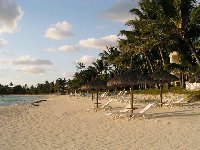
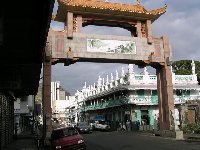
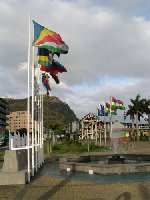
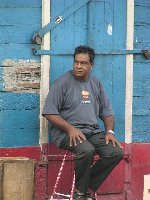
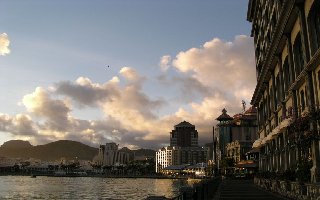
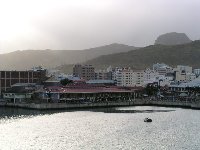
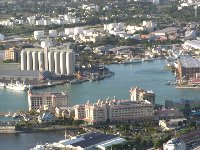
![]() Seychelles: Sex Politics In The Garden Of Eden
Seychelles: Sex Politics In The Garden Of Eden






![]() Send
your comments to Tan Wee Cheng, Singapore
Send
your comments to Tan Wee Cheng, Singapore![]() Back to Homepage of CHASING THE INDRI
Back to Homepage of CHASING THE INDRI
![]() Back to the Main Homepage of Weecheng.com
Back to the Main Homepage of Weecheng.com